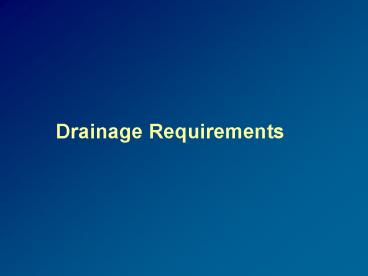Drainage Requirements - PowerPoint PPT Presentation
1 / 20
Title:
Drainage Requirements
Description:
For development with basement not fully covered, keep the catchment area to the minimum. ... discharged to 1st storey drain and not into the basement pump sump. ... – PowerPoint PPT presentation
Number of Views:639
Avg rating:3.0/5.0
Title: Drainage Requirements
1
- Drainage Requirements
2
Principles of Designing a Drainage System
Ensure platform levels of the development site
are not lower than the road level/ ground level
at the outlet discharge point or the specific
minimum platform level imposed by the Department
(whichever is higher)
Platform levels within the development site lower
than the adjacent road / ground levels at the
outlet discharge point.
3
Principles of Designing a Drainage System
Provide crest levels at all openings (eg
ventilation openings, stairways, pipelines,
voids, rampdown etc to basement served by pumped
drainage system.
- The crest level does not comply with the
requirements as specified in the Code of Practice
on Surface Water Drainage.
No crest level provided
4
(No Transcript)
5
(No Transcript)
6
Principles of Designing a Drainage System
Select the outlet discharge point at the
roadside/outlet drain where the adjacent
road/ground level is the lowest.
The existing outlet discharge point(s) at the
development site shall be adopted.
If the roadside drain is located on a sloping
road, the proposed internal drain should be
connected to the downstream end of the roadside
drain fronting the development site.
7
Principles of Designing a Drainage System
For development with basement not fully covered,
keep the catchment area to the minimum. Runoff
from RWDPs should be discharged to 1st storey
drain and not into the basement pump sump.
Runoff from basement discharges by gravity to
roadside/outlet drain which is on higher ground
level.
Runoff from roofs, rainwater down- pipes and all
premises at and above ground level discharges
into the basement.
8
Principles of Designing a Drainage System
Ensure runoff within a development site is
drained off by internal drains and is not
discharged into adjacent premises.
9
Principles of Designing a Drainage System
Design the drainage system for safety and ease of
maintenance besides adequate capacity.
10
Principles of Designing a Drainage System
Do not alter or realign existing roadside/outlet/
common drains unless approval is given by the
Department.
11
Principles of Designing a Drainage System
All services shall undercross the drains at
minimum 1.0m (1.5m for earth drains) below the
invert levels of the drains.
QPs shall seek the Departments approval for
proposals on services overcrossing.
Drainage Dept will consider services overcrossing
if the Services Providers request it and the
services pipes overcrossing drain will not affect
the flow or not cause maintenance problem.
12
Debris trapped by overcrossing pipe
13
SOME COMMON ISSUES RAISED DURING WALK-IN
PRECONSULTATION
14
Can the Drainage Reserve be Realigned ?
- A drainage reserve (DR) may be realigned
subject to the following conditions- - a) The proposed drain diversion is
technically feasible. - b) Maintenance access to the upstream and
downstream DR is not affected. - c) Concurrence from SLA/URA.
15
Can the Common Drain be Fenced -In Within
Development Lot ?
- Drainage Department can consider fencing-in of
the existing common drain within the development
lot if the access to maintain the existing
upstream or downstream common drain is not
affected.
16
Required Sizes of Entrance Culvert/Roadside Drain
- QP is to write to the Department for the required
size of proposed entrance culvert/roadside drain
before submitting the plan to CBPU for
registration.
17
Must Existing Roadside Drain be Realigned to Abut
the New Road Reserve Line?
- The existing roadside drain can be retained if it
is not required by LTA to be realigned to abut
the new Road Reserve Line. - If the existing roadside drain is to be
realigned, it shall be constructed to the
required drain size.
18
Must Roadside Drain be Constructed as Closed
Drain?
- The roadside drain can be constructed as closed
or open drain.
19
Can Rainwater Downpipe be Smaller Than 150mm ?
- Smaller rainwater downpipes of less than 150mm
diameter are allowed in accordance with Singapore
Standard CP261983 Code of Practice for Drainage
of Roofs on condition that the roof drainage
channels are provided with leaf covers.
20
- THANK YOU































